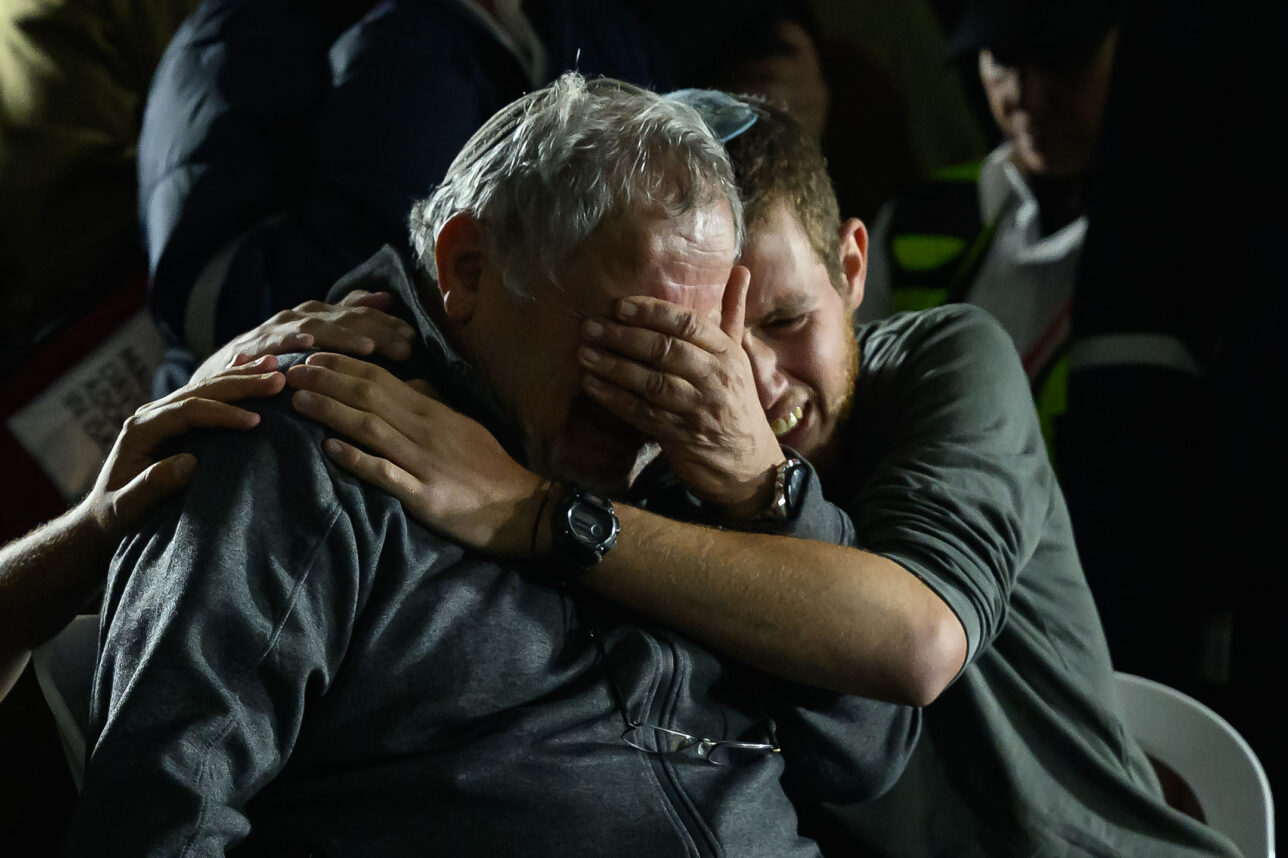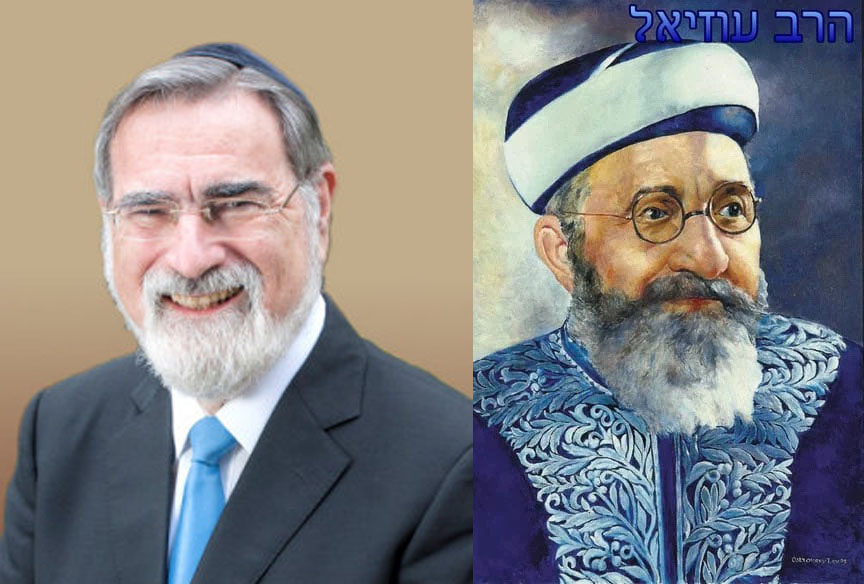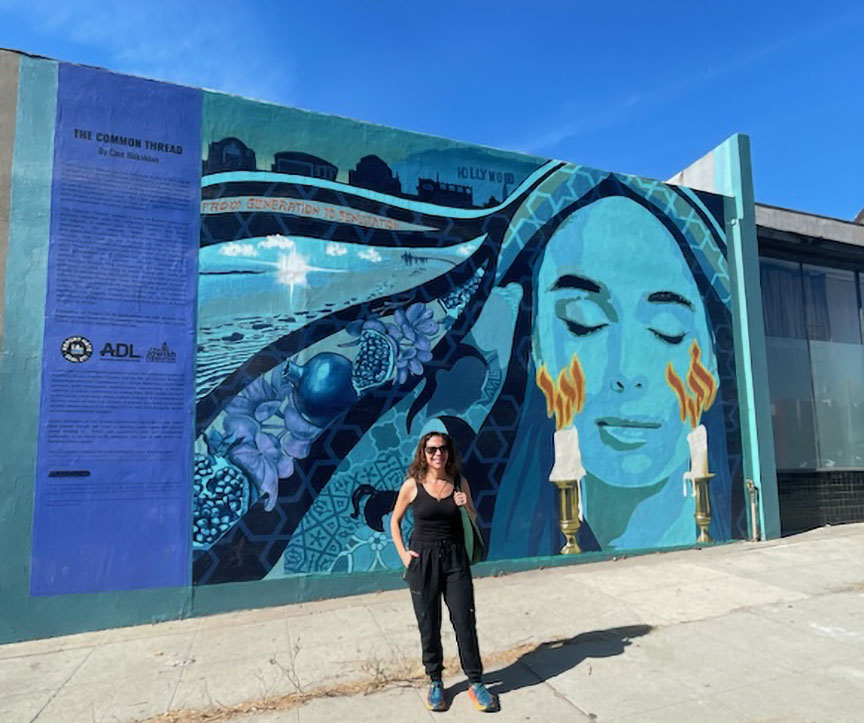In 1942 on the eve of Passover, Dora Werzberg, a 21-year-old French Jew, walked through the gates of the Rivesaltes internment camp in Vichy, France. She arrived at the camp not by force but by choice, as a volunteer social worker sent by the Oeuvre de Secours Aux Enfants, (OSE), a French-Jewish welfare organization.
Today, at 95, Dora Werzberg Amelan, who still lives independently at her Paris home, has outlived all her OSE supervisors and co-workers. When I learned about Amelan last November, I immediately wanted to interview her. I had read about and interviewed camp internees, but here was a different side of the story, and one that has received little attention — the relief worker’s experience.
Not wanting to let the opportunity slip by, I traveled to Paris in December, booking a room close to her apartment building. As I stepped off the elevator, a booming “allo,” directed me to her home. Gray-haired, dressed in gray and leaning against the door, she appeared to be like any grandmother, except for her trendy, fluorescent blue glasses and the vigorous voice.
Over coffee and slices of fruit stolen, she told her story.
 Dora Amelan. Photo by Charlotte Bonelli
Dora Amelan. Photo by Charlotte Bonelli
At the war’s outbreak, her family, French nationals living in Belgium, fled to unoccupied France, where she met the charismatic OSE supervisor Andrée Salomon. At their very first meeting, Amelan decided to help her imprisoned coreligionists at Rivesaltes.
On Oct. 4, 1940, the Vichy French government had authorized the internment of foreign Jews. It was a mixed population composed of East European Jews, some of whom had lived in France for decades without becoming nationalized, German-Jewish refugees as well as German Jews whom the Nazis had dumped into unoccupied France, and Jews from the Low Countries who had fled the Nazi blitzkrieg of May 1940.
Eventually, it was hoped, these foreign Jews would leave France. Until that time, it was best, so thought the Vichy government, to place them in holding centers along with political dissidents, Gypsies and Spanish Civil War refugees. By the end of 1940, of the roughly 45,000 imprisoned at these camps, an estimated 70 percent were Jewish.
Little thought had gone into Amelan’s decision to answer Salomon’s call for volunteers. But in her first day at Rivesaltes, she had ample time for reflection. The OSE staff had left for the Passover holiday, leaving Amelan on her own to explore this massive camp located on a plain between the Pyrenees and the Mediterranean.
Row after row of dismal concrete housing units, unheated and poorly lit, stretched out into the barren landscape. “Ah, the smell of the barracks,” she exclaimed, rolling her eyes. “Day and night they were in the same dirty clothes. There were no pajamas.” Nor were there beds. Inmates slept on wooden frames topped with straw.
Stepping into the “so-called hospital,” she was assaulted by the stench of urine, saved in large bedpans and later used to study the effects of a lack of protein in the diet.
Asked about her first impression of the internees, she replied, “They had no real thought or reaction, just the look of just giving up. I had never experienced such misery. I was young with no life experience. I wondered if I could support this work.”
A full seven-day work week quickly erased her early doubts. She assisted internees with correspondence, distributed donated clothing and delivered extra rations, supplied by the Secour Suisse, to those in the infirmary, who were on the verge or already suffering from starvation.
Amelan described one experience that, in her opinion, summed up life at Rivesaltes. One day, she and her colleague Simone Lipman had just lugged an industrial-size pot, filled with rice, milk and cheese, to the hospital’s doorway, when suddenly a handle snapped off. The pot crashed to the ground, its contents spreading across the floor.
The hospitalized inmates had lost their supplementary meal. But the spilled food was not wasted. Internees who had been trailing Amelan and Lipman, hoping to snatch a few scraps, dived to the floor, spoons in hand. “They always had a little spoon in their pocket. You never know where you could find food,” Amelan remembered. “They were on all fours eating from the floor.”
The children were the other group designated for extra rations. Every afternoon, the Secour Suisse relief agency prepared hot chocolate and bread for them. This well-intentioned and seemingly simple act was often thwarted by the camp’s logistics and the weather. To partake in this treat, the children had to march more than a kilometer from their residences to the Secour Suisse barrack. “In this climate, with the wind,” Amelan said, “they very often couldn’t do it. Even I couldn’t ride my bike sometimes because of the wind.” For roughly 100 days a year, the Tramonte, a fierce wind, barreled through the camp, at times reaching a speed of 75 miles per hour.
All struggled in the camp, particularly the children. OSE made their liberation and relocation to OSE children’s residences in villages and towns outside of the camp its top priority. “We had an office where we received the parents,” Amelan recalled. “And all whose parents agreed, and we could get permits for, were taken out.” The cut-off age, as Amelan remembers, was 13 or 14. “Whenever we could, we lied about the age of the child and made false papers.”
Vichy authorities were amenable to the children’s relocation because it relieved the camp commandant of a responsibility. Five hundred Jewish children were released from Rivesaltes. Most of these children, unlike their parents, escaped the impending deportations east.
Historian Robert Paxton notes, “When the Vichy government learned in the spring of 42 that the Germans were going to run trainloads of Jews back off to the East; they volunteered 10,000 foreign Jews from the unoccupied Zone. They wanted to empty those camps.”
From Aug. 11, 1942 until Oct. 20, 1942, 2,289 foreign Jews were deported from Rivesaltes, first to Drancy, a transit camp outside of Paris, and then to Auschwitz. During this period, Amelan was startled to encounter the parents of friends from Belgium. “They came to me and begged me to help them. But if we freed one person, another one was immediately put on the list … the Germans asked for so many people per day or per week. ”
Aware that the couple was planning an escape, Salomon, the OSE supervisor, instructed Amelan not to get involved.
Salomon had relieved Amelan of the burden of decision making, but she could not free the 21-year-old from the ensuing guilt. For the first time, Amelan came close to the breaking point. “It was a heavy load,” she said. “I could not endure it.” And so, Salomon transferred Amelon to Camp Gurs.
Well to the west of Rivesaltes, Gurs sat at the foot of the Pyrenees, near the Spanish border. “The landscape was friendlier at Gurs,” Amelan recalled. “It was green, and there were woods.”
Yet Gurs had the same problems as other Vichy internment camps: inadequate food and medicine, horrid sanitation and poor housing. “If Auschwitz was hell,” recalled one survivor, “Gurs was purgatory.”
Occasionally, Amelan and a friend, Ms. Resh, a Quaker volunteer, would leave “purgatory” behind, riding their bikes to a village restaurant. Relishing this chance to relax, before drinking her wine, Resh would hoist her glass and declare, “‘It’s as if an angel flies down my back.’”
I asked if Resh ever felt guilty about dining at a restaurant when those back at Gurs barely had enough to eat. “Guilty, no, I don’t think she ever talked about being guilty,” Amelan replied. “And she was a very solid person.” Neither did Amelan have guilt about these brief respites.
Probably no aspect of camp life created more anxiety or pain than the deportations. As the decades have passed, Amelan’s recollections of individual inmates, their faces, voices and pleas, have slipped away. A young Jew from North Africa is the exception.
“There in the darkness of the night he asked me, ‘Mademoiselle Dora, what do you think will happen to us?’ ” She responded, “For the very young and the elderly it will certainly be the end. But you are young and maybe can work.”
But the young man was uncertain there would be work for him stating, “If I am to be killed or tortured, I would rather fight and die here.” Amelan answered, “I can’t advise you.” She took his watch and other personal items to forward to relatives.
Between Aug. 6, 1942 to March 3, 1943, 3,903 Jewish inmates were deported from Gurs. The majority was sent to extermination camps. “Certainly we knew that they were not going to a camp for fun,” Amelan said. “But did we know about the gassings? No.”
Initially, the Vichy French had, in the summer of ’42, turned to foreign Jews to fill Nazi quotas, giving some French Jews a false sense of security. Yet, by the time Gurs closed in November 1943, there was no longer a distinction between foreign Jews and French Jewish citizens. Amelan, now herself a target for arrest and deportation, left for Limoges with false identity papers.
For the first two months, she was a courier delivering payments from the American Jewish Joint Distribution Committee to families hiding Jewish children. It is estimated that the OSE, either on its own or in cooperation with other organizations, saved more than 5,000 Jewish children.
At the suggestion of and with the help of George Garel, the head of OSE’s underground network, Amelan spent the remainder of the war studying at a nursing school in Toulouse.
During her year and a half at Rivesaltes and Gurs, Amelan had been a camp “social worker.” In truth, she had no formal training. After the war, she earned a degree in social work in Paris. In 1948, she married and left for Israel, where she was a social worker for more than three decades before returning to Paris in the 1980s.
Amelan was not the only one in her family associated with OSE. Her teenage cousin, Marcel Mangel, had given drama lessons to the children at OSE residences. Millions around the world would come to know him as the famous French actor and mime, Marcel Marceau.
At the conclusion of our meeting, I asked how a young woman, from an assimilated middle-class French family, withstood work and life at Rivesaltes and Gurs. She shredded my question. “I did not get up every day and think, ‘How do I feel? What do I want?’ My person ceased to exist. I was there to do a job.”
Asked if this attitude strengthened her, Amelan countered, “I would put it differently. Let’s say it didn’t weaken me. And it is easier to be the one giving help than the one waiting to receive it.”
Charlotte Bonelli is the author of “Exit Berlin” (Yale University Press, 2014).





















 More news and opinions than at a Shabbat dinner, right in your inbox.
More news and opinions than at a Shabbat dinner, right in your inbox.